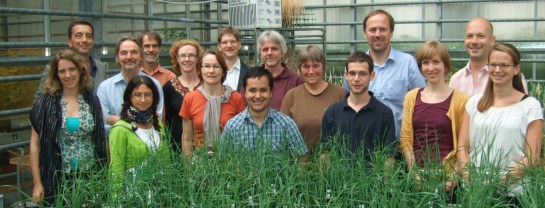Stakeholders
Farmers, consumers, researcher, politicians, farming associations.
All targets are also relevant for all other countries outside the partner countries, as an effective and improved P recycling is of worldwide relevance.
|
[Left: Roots at day 32 after sowing]
[Right: Zoom at sludge spot]
|
Background
Organic farming systems rely on the efficient use and recycling of available resources.
Currently, some mineral nutrients like phosphorus are used only once to produce food.
Subsequently, they are lost due to poor recycling of organic wastes back to farmland.
Simultaneously, P-balances calculated for OF indicate that often more P is removed with the products than applied as fertilizer.
Consequently, this leads to decreasing amounts of plant available soil P.
There is an urgent need to improve the recycling of P from urban areas and the food industry, back to cropland.
|
|

Assessment of the suitability of recycling phosphorus fertilizers for organic farming |

[Improve_P team]
The project purpose is to develop strategies to balance P cycles in organic farming with recycling fertilizers.
The reason is that many long term organic managed farms show a strong decrease in soil P levels affecting long term sustainability.
The main regions of investigation are Central and Northern European countries
News
At a workshop during the 18th Organic World Congress, Istanbul October 2014, researchers from the Improve-P project discussed recycling of phosphorus (P) in organic agriculture with stakeholders from several European countries.
Watch the video:
|
Expected benefits

The main impact of the project will be the improved cycling of P at a regional scale which is (in principle) in full accordance with the goals of OF. Furthermore, the long term P status of OF soils will be improved by the implementation of management measures aimed at balancing P budgets. This project will address farmer concerns about the agronomic and economic viability of optimized systems that ensure efficient P recycling back to agriculture through the use of alternative P fertilizers (APF). Moreover P nutrient use efficiency will be increased through stimulating biological soil processes. In addition, potential environmental issues arising from the use of APF will be assessed. Recommendations about the suitability of improved crop production practices and the use of APF will be formulated based on a broad base of stakeholder input.
Farmers will get benefits from information about APFs and their agronomic efficiency, the organic movement will get tools to increase their credibility and consumers/politicians a compilation of information assessing the potential benefits and risks of their use.
|
Expected outcome
-
IMPROVE-P will help to halt the decline in P availability of organically farmed soils by identifying sustainable agronomic practices in OF and suitable APF.
-
By addressing the issue of P availability in OF systems, IMPROVE-P will contribute to the development of more resilient cropping systems with higher yields and yield stability.
-
IMPROVE-P will make a valuable contribution to the body of knowledge on APF that will be applicable in the conventional sector as well as the OF sector. Trials will generate data on plant growth after application of APF and plant bioavailability of P in APF in soils. This will be a major scientific innovation since such data are scarce in Europe.
-
IMPROVE-P will deliver scientifically validated recommendations on: a) the most suitable APF b) the best approaches to assess the quality of APF in relation to the benefits from their use, and c) optimized agronomic practices, techniques and technologies adapted to different crop production systems under different pedo-climatic conditions in the participating countries.
-
IMPROVE-P will deliver a ranking of plant growth promoting rhizobacteria (PGPRs) able to mobilize soil P under different pedo-climatic conditions and crops.
-
IMPROVE-P will contribute to developing sustainable approaches to close nutrient cycles between urban and agricultural areas in Europe.
-
IMPROVE-P will generate science-based knowledge on APFs and PGPRs suitable for OF, and provide a solid basis for a discussion of EU regulations.
|
|
Search Organic Eprints
The open archive includes a vast amount of documents on organic certification
Search the open archive
More search options on www.orgprints.org
|  |
Main project activities
Compilation and evaluation of the current knowledge on P management in organic farming and alternative P fertilizer
Experiments about the P efficiency of alternative P fertilizers
Experiments about the impact of agronomic and biological means to improve plant P efficiency
Evaluation of stakeholder perceptions in the participating countries
|
Coordinator:
PD Dr. Kurt Möller, Universität Hohenheim, Germany
Partners:
Julia Cooper, Newcastle University, United Kingdom
Astrid Oberson, Institute of Agricultural Sciences, Switzerland
Paul Mäder, FiBL, Switzerland
Jakob Magid, University of Copenhagen, Denmark
Anne-Kristin Løes, Bioforsk, Norway
Stefan Hörtenhuber, FiBL, Austria
Jürgen Friedel, BOKU, Austria
|
|